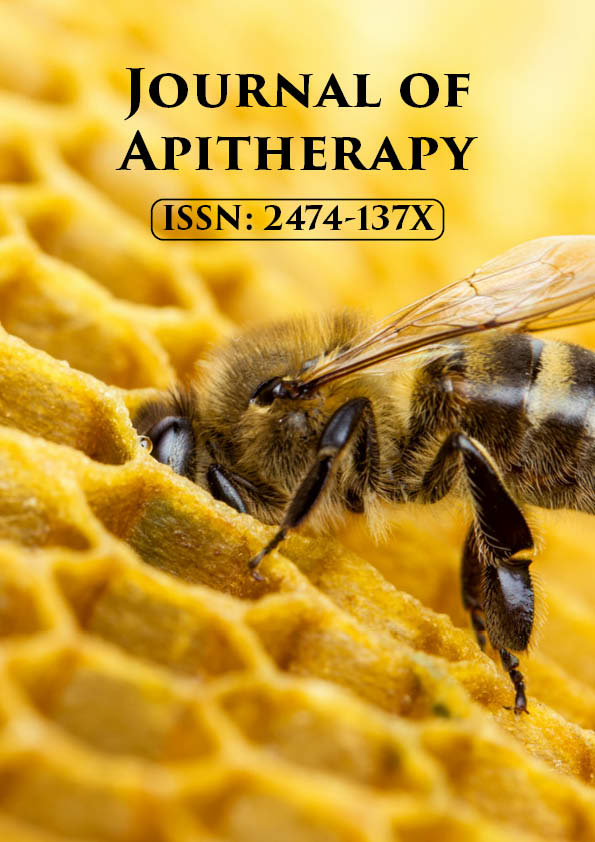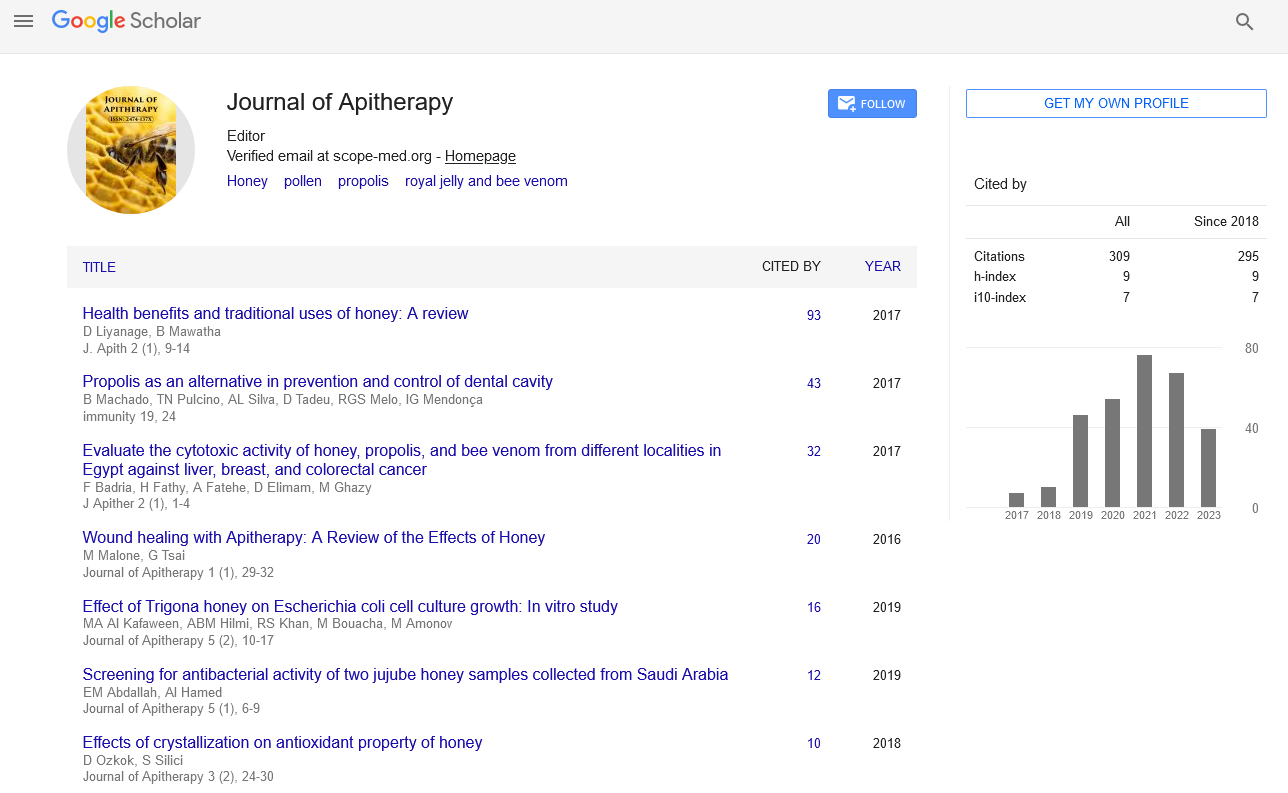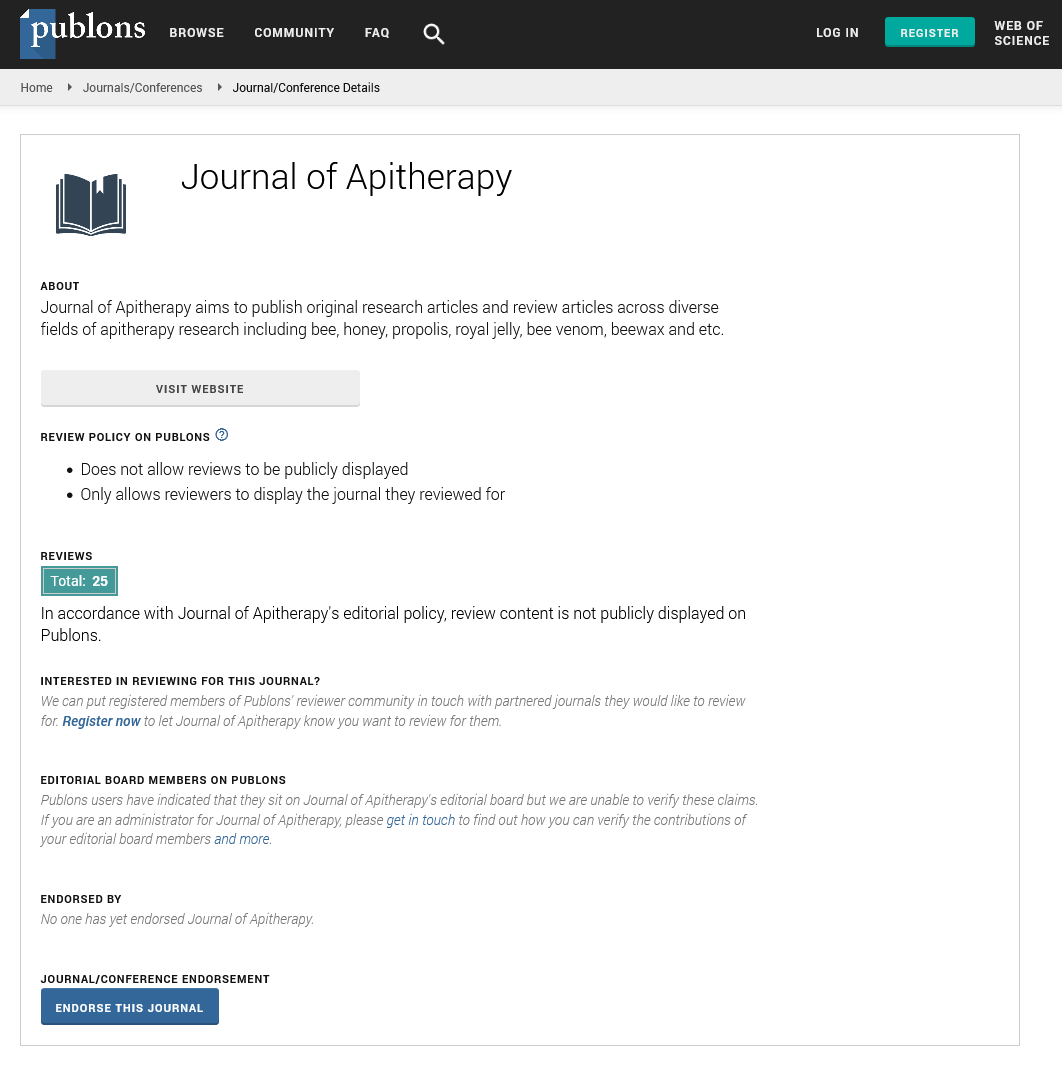Opinion Article - Journal of Apitherapy (2023)
Bee Pharming: Transforming Agriculture through Controlled Bee Management
Mohamad Abdul-Hafeez*Mohamad Abdul-Hafeez, Department of Apiculture, Yeditepe University, Istanbul, Turkey, Email: mohhafeez555@gmail.com
Received: 03-Aug-2023, Manuscript No. JAPITHERAPY-23-112579; Editor assigned: 07-Aug-2023, Pre QC No. JAPITHERAPY-23-112579(PQ); Reviewed: 21-Aug-2023, QC No. JAPITHERAPY-23-11279; Revised: 28-Aug-2023, Manuscript No. JAPITHERAPY-23-112579(R); Published: 04-Sep-2023
Description
Bee farming, often referred to as "bee pharming," is a groundbreaking and innovative agricultural practice that has gained prominence in recent years. This method involves the controlled breeding and management of bees for various purposes, primarily to meet the growing demand for pollination services, honey production, and the harvesting of bee-derived products. Bee pharming represents a sustainable and environmentally friendly approach to meeting the needs of agriculture and apiculture while also addressing the challenges posed by declining bee populations and the increasing importance of pollinators in food production.
Importance of bees in agriculture
Bees, particularly honeybees and certain species of wild bees, play an indispensable role in global agriculture. They are critical pollinators for many crops, including fruits, vegetables, nuts, and oilseeds. Without their pollination services, the yield and quality of these crops would significantly decline, affecting both food security and the economic viability of agriculture.
Decline of bee populations
Despite their vital role, bee populations have been facing a range of threats that have led to alarming declines. These threats include habitat loss, pesticide exposure, diseases, parasites, and climate change. The loss of bee populations poses a significant risk to global food production, as approximately one-third of the world's food crops rely on pollinators for fertilization.
A Sustainable Solution:
In response to the decline in bee populations and the need for sustainable agricultural practices, bee pharming has emerged as a viable solution. This approach involves the controlled breeding and management of bees in controlled environments, such as apiaries, to address various agricultural needs. Here, we delve into the key aspects of bee pharming and its potential benefits.
Controlled pollination services
One of the primary purposes of bee pharming is to provide controlled pollination services to agriculture. Beekeepers rear colonies of bees, ensuring their health and readiness to pollinate specific crops when needed. This method reduces the reliance on wild bee populations, which are susceptible to environmental pressures and diseases. Controlled pollination can significantly increase crop yields and quality, benefiting farmers and consumers alike.
Sustainable honey production
Bee pharming also focuses on honey production. Managed bee colonies are carefully monitored and cared for to optimize honey production. This approach allows beekeepers to harvest honey sustainably without harming wild bee populations. Sustainable honey production not only meets consumer demand but also promotes ethical beekeeping practices.
Bee-derived products
Beyond honey, bee pharming explores the production of various bee-derived products, such as beeswax, royal jelly, propolis, and bee venom. These products have diverse applications in cosmetics, medicine, and dietary supplements. Bee pharming ensures the availability of these resources without negatively impacting wild bee populations.
Genetic preservation
Bee pharming also serves as a means to preserve bee genetic diversity. By selectively breeding bee colonies, researchers and beekeepers can maintain and enhance desirable traits, such as disease resistance, adaptability, and productivity. This genetic preservation can contribute to the long-term survival of bee species.
Benefits of bee pharming
The practice of bee pharming offers several noteworthy advantages:
Enhanced agricultural productivity: Bee pharming can lead to increased crop yields and improved crop quality through controlled and efficient pollination services.
Conservation of wild bee populations: By reducing the reliance on wild bees for pollination, bee pharming helps protect and preserve these essential pollinators.
Sustainable honey production: Beekeepers can produce honey sustainably, promoting ethical practices and ensuring a stable supply of this natural sweetener.
Development of bee-derived products: Bee pharming enables the production of various bee-derived products with numerous applications, contributing to the pharmaceutical and cosmetic industries.
Genetic preservation: This practice helps conserve and enhance desirable bee traits, promoting bee resilience and adaptability.
Challenges and concerns
While bee pharming offers many benefits, it also faces challenges and concerns that need to be addressed:
Disease management: Managed bee colonies can still be susceptible to diseases and pests. Careful monitoring and proactive disease management are essential to prevent outbreaks.
Ethical considerations: The ethics of manipulating bee populations and harvesting bee products must be carefully considered. Practices should prioritize the welfare of bees and environmental sustainability.
Potential for reduced genetic diversity: Intensive selective breeding in bee pharming could lead to reduced genetic diversity, making bee populations more vulnerable to new threats.
Environmental impact: The location and scale of bee pharming operations must be carefully managed to minimize potential environmental impacts, such as competition with wild bee populations for resources.
Regulatory oversight: Adequate regulatory oversight is needed to ensure that bee pharming practices adhere to ethical standards, environmental regulations, and food safety guidelines.
Bee pharming represents a promising approach to address the challenges of declining bee populations, increasing agricultural needs, and the demand for bee-derived products. By providing controlled pollination services, sustainable honey production, and the responsible development of bee-derived products, bee pharming offers a path toward more sustainable and resilient agricultural practices. However, it is crucial to strike a balance between reaping the benefits of bee pharming and addressing its challenges and concerns. Ethical considerations, disease management, and environmental impact must be carefully managed to ensure the long-term success of this innovative agricultural practice. As the world continues to grapple with food security and environmental sustainability, bee pharming stands as a testament to human ingenuity and our ability to work in harmony with nature to meet our agricultural and apicultural needs while safeguarding the future of these essential pollinators. With responsible practices and ongoing research, bee pharming has the potential to revolutionize agriculture and ensure a world where bees continue to thrive alongside our growing demand for their services and products.







